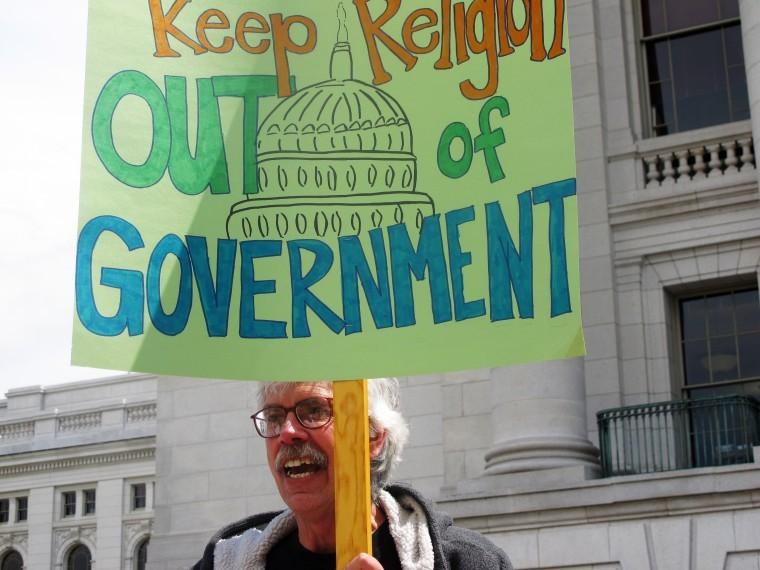PRELL: Prayer too personal to mandate
Ryan J. Foley/The Associated Press
Bill Dunn rallies in favor of U.S. District Judge Barbara Crabb’s ruling that found the National Day of Prayer unconstitutional May 6 outside the Wisconsin Capitol.
May 10, 2010
Ah, the summer. Time to relax, catch some sun, and let the worries and troubles of the world take a back seat to more leisurely activities.
Or not.
When I went home for a few days last week, I peeled open the household’s copy of the Sioux City Journal. Flipping to the opinion section, I was reminded that May 6 was the 59 observance of the National Day of Prayer. This year the holiday had taken on a particular level of significance, as less than a month prior, U.S. District Judge Barbara Crabb ruled that the day was unconstitutional, violating the establishment clause of the First Amendment.
The Journal’s editorial claimed they had “one word to describe” the ruling: “Absurd.” Well, I’ve got one word to describe the Journal’s assertions: absurder — yes, I know that’s not a real word.
Here’s the main thrust of their — and many others’ — argument, in the Journal’s words:
“Bottom line: The National Day of Prayer neither establishes a national religion nor prefers one religion over another.” After all, “The day is nondenominational. This isn’t National Day of Jesus Christ.”
And yet, the National Day of Prayer Task Force lists on its website a mission to “publicize and preserve America’s Christian heritage,” “glorify the Lord in word and deed” and “foster unity within the Christian Church.”
To be fair, they also have a point to “respect all people, regardless of denomination or creed.” But doesn’t that seem oddly, I don’t know, contradictory? It just feels to me like there’s a lot of wink-wink, nudge-nudge going on here. With Obama specifically mentioning God with a capital “G” twice in his proclamation, I get the sense that the sentiment of “well, you don’t have to pray” is just thrown in for appeasement.
Just look at the ending of the second-to-last sentence in Obama’s speech: “in accordance with their own faiths and consciences … I invite all people of faith to join me in asking for God’s continued guidance, grace, and protection … ” It’s like a kid turning in an essay, getting marks from the teacher that they forgot to incorporate alternative perspectives, and so when they turn in a finished product it reads exactly the same, but they threw in four words instead of actually re-thinking their perspective.
I’m not okay with the justification for an argument amounting to an “it’s been that way for a long time” talking point, which is exactly what we have here. By tweaking the angles to suit people of various faiths, the government has tried to nail aesthetically appealing window blinds to a decrepit and crumbling house. What needs to be done is something not many of us want to do: learn our history.
The National Day of Prayer was established in 1952 — two years before the addition of “under God” was added to the Pledge of Allegiance — by U.S. code which now states: “The President shall issue each year a proclamation designating the first Thursday in May as a National Day of Prayer on which the people of the United States may turn to God in prayer and meditation at churches, in groups and as individuals.”
In other words, this day has been broken from the start. Instead of enacting a holiday for citizens to simply appreciate and observe the religious freedom and diversity our country allows us, we’ve been endorsing and promoting not only the Christian belief system, but the manner and place of prayer.
Prayer should be my choice, not the government’s, and that’s the issue behind a National Day of Prayer. Crabb’s decision isn’t an attack on Christianity, it’s a judge doing exactly what she should be: applying the law of the Constitution to the law of the land.
Religion and prayer is a very personal matter. I say, let’s keep it that way.







